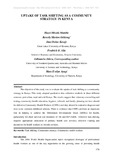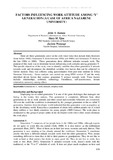Faculty of Arts & Social Sciences (FoA&SS / FoL / FBM): Recent submissions
Now showing items 1101-1120 of 6704
-
Investigating the influence of firm characteristics on financing of microfinance institutions in Kenya
(University of Nairobi, 2014) -
Linkage dynamics between small and large firms in Kenya
(University of Nairobi, 2005) -
Growth determinants of micro and small manufacturing enterprises in Kenya
(University of Nairobi, 2001) -
The Effect Of Human Resource Strategic Orientation On Performance Of Large Private Manufacturing Firms In Kenya
(University of Nairobi, 2013) -
The Rise Of Shopping Malls: From Shopping Centres To MegaMarkets." SOKONI,
(University of Nairobi, 2001) -
Korean Government Scholarships
(University of Nairobi, 2015) -
The Economic Lifecycle and Population Age Structure
(University of Nairobi, 2007) -
Perspectives of family members participating in cultural assessment of psychiatric disorders: Findings from the DSM-5 International Field Trial
(2015)Despite the important roles families play in the lives of many individuals with mental illness across cultures, there is a dearth of data worldwide on how family members perceive the process of cultural assessment as well ... -
Alcohol Abuse and the Family: A Case Study of the Nandi Community of Kenya
(2013)This study investigated factors that have led to alcohol abuse among the household heads and its contemporary socioeconomic effects on family life in Kenya. The main objective of the study was to find out the socio-econ ... -
Perspectives of regional integration in the East African Community
(2013)This paper analyses the perspectives of Regional Integration in the East African Community. It delves into the process, prospects and challenges towards integrating the East African Community countries of Kenya. ... -
Collateral Strategies for Poverty Reduction in Kenya: Prospects and Challenges
(2014)In practice all over the world, development practitioners’ concern about poverty has been increasing because of their long history in working with the marginalized groups amidst inadequate resources and unfavourable scenarios ... -
Effect of Information Technology Outsourcing on the Performance of Banks in Kenya: Application of the Balanced Scorecard
(University of Nairobi, 2015)Purpose: The study sought to look at Information Technology Outsourcing (ITO) practices in the Kenyan banking sector and the effect it had on performance. Balance Scorecard was used to measure performance as it considers ... -
Building legal bridges: fostering eastern Africa integration through commercial arbitration
(University of Nairobi, 2015)This paper explores the feasibility of commercial arbitration as a means to foster the process of Eastern Africa integration. Th e author proffers an argument in the context of Eastern Africa integration, that commercial ... -
Extent to which community participation in project identification and planning influences sustainability of NMK food security projects in Kisumu West, Kenya
(2015)Community participation has been ignored in the development of these interventions leading to failures and non-sustainable Projects. To address this shortcoming governments have employed a new strategy of partnership ... -
Development after 2015: the right to health for migrants
(University of Nairobi, 2013) -
Uptake of task shifting as a community strategy in Kenya
(University of Nairobi, 2013-05)The objective of the study was to evaluate the uptake of task shifting as a community strategy in Kenya. This study adopted qualitative data collection methods in three different contexts; peri-urban, rural and arid Kenya. ... -
Uptake of community health strategy on service delivery and utilization in Kenya
(University of Nairobi, 2013-08)Great Lakes University of Kisumu developed and tested a Comprehensive Primary Health Care (CPHC) model to facilitate the uptake of essential health services towards Millennium Development Goals (MDGs). The model focused ... -
Factors influencing work attitude among ‘y’ generation (a case of Africa Nazarene University
(University of Nairobi, 2014-06)There are three generations active in the work force today that include Baby Boomers (born before 1950), Generation X (born between 1950s and 1980s) and Generation Y (born in the late 1980s to 2000). These generations ...













